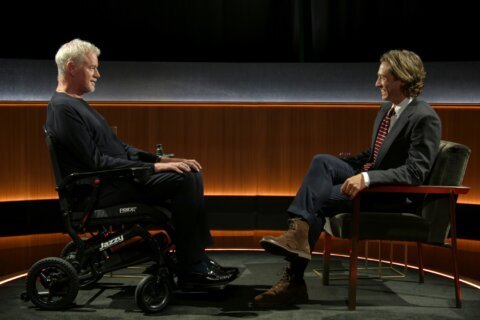Listen to our full conversation on my podcast “Beyond the Fame.”
“Two crashes of brand new airplanes within five months of each other. That doesn’t happen in modern aviation,” says the Netflix film “Downfall: The Case Against Boeing.”
The documentary will screen at the Capitol Visitor Center on Wednesday at 5 p.m., followed by a Q&A with Oscar-nominated director Rory Kennedy (“Last Days in Vietnam”), the daughter of the late Robert F. Kennedy, as well as Congressman Peter DeFazio, Capt. Dan Carey and father Michael Stumo, whose daughter Samya was killed.
“I fly like so many people and had read about the first airplane crashing,” Kennedy told WTOP. “When a second plane crashed and it was the same kind of plane, a 737 Max, within five months of each other … in eerily similar circumstances and 346 people lost their lives, including Samya, I was very upset and shocked about what happened.”
The first crash on Oct. 29, 2018 saw Lion Air Flight 610 plummet into the Java Sea after departing Jakarta, Indonesia, killing all 189 on board the Boeing 737 Max jet.
Five months later on March 10, 2019, another Boeing 737 Max jet, this time Ethiopian Airlines Flight 302, tragically crashed in Ethiopia, killing all 157 people on board.
“Instead of responding in the way I would imagine, which is to not only say how deeply sorry they are but also to ground the planes immediately to get to the bottom of what happened … their response was to focus on the pilots, very suggestive of pilot error,” Kennedy said. “I felt like there was much more going on behind the scenes.”
The documentary takes us behind the scenes with background of the case.
“The 737 line is from 1967,” Stumo said. “Instead of building a new plane, they kept tweaking and upgrading, making a very different plane over the years, 14 or so different iterations. This last one, they were putting big, new engines under it, but the plane was set low … so they put the engines forward up from the wings, which made the aircraft tip up.”
To counterbalance this, Boeing installed an anti-stall system called MCAS (Maneuvering Characteristics Augmentation System), but the pilots were never even told about it.
“They put in secret software that would take control … that would push the nose down, so they would never feel that tip-up tendency,” Stumo said. “Two angle-of-attack sensors on each side of the plane are designed to tell what kind of tilt the plane has in relation to the oncoming wind. … That sensor went bad … only one sensor, no redundancy.”
Pilots only had 10 seconds to override the system, but they didn’t know it existed.
“The sensors went bad, sent weird data to the computer, which told the software … to push the nose down,” Stumo said. “It kept pushing down hard and the pilots are wondering why, there’s a lot of alarms going off in the cockpit. … It’s a roller-coaster ride, pilots trying to pull up, software pushing it down, and in both cases, the pilots didn’t have the strength.”
The documentary alleges a giant cover-up by Boeing, which didn’t include MCAS in its flight manuals, balked at requests for flight simulator training, misled the Federal Aviation Administration, and bragged in messages about playing “Jedi mind tricks” on regulators.
“They knew this MCAS system could cause that kind of catastrophe,” Kennedy said. “We know that from internal memos. … As far back as 2016, there was a memo that showed that Boeing knew based on its own research that this MCAS system could cause a catastrophic event, which means everybody on the plane would die from a crash.”
Which discovery upset her the most in making the film?
“After the first crash … there was a report done by the FAA … that concluded this airplane, the 737 Max, would likely crash 15 times over the course of its lifetime, which is on average once every two years,” Kennedy said. “Boeing and the FAA made the decision to keep that airplane in the air! … They knew it would cost so much money to ground it.”
Ultimately, Boeing was fined $2.5 billion in 2021, pocket change compared to its $76.6 billion in sales the same year. The deferred prosecution agreement with the Department of Justice also resolved a criminal charge that Boeing had conspired to defraud the FAA.
“The board never met about safety, but instead granted themselves stock options, more executive compensation, dividend buybacks,” Stumo said. “Boeing got the Department of Justice to throw two pilots under the bus and exonerate everybody at the top. … Dennis Muilenburg, former CEO of Boeing, left with a $63 million golden parachute.”
As the credits roll, audiences will leave the film outraged.
“The third act of the film, we really understand what Boeing knew and when,” Kennedy said. “Boeing knew this airplane was likely going to crash and they still put that airplane in the air. I don’t know how people make that choice and how people who had family on that second airplane are able to reconcile. …. The loss you must go through is beyond words.”
Stumo still misses his daughter, Samya, who died at age 24.
“She was beautiful, smart, charismatic, loving, had it all, taught herself to read at age 3 to 4, she was raising pigs on our farm at age 7, driving a tractor at age 9,” Stumo said. “She got a global health degree and a free-ride scholarship by the Danish government in Copenhagen and had taken this job to set up global health offices in East Africa.”
After flying from D.C. to the Ethiopian capital of Addis Ababa, Samya texted her parents that she was about to board a flight to Nairobi, Kenya, but she sadly never made it.
Her parents are still taking the grieving process day by day.
“You don’t move on, you sort of move through,” Stumo said. “It starts as an open wound that’s a sharp, throbbing pain. … It scabs over in time and ultimately you have scar tissue. … My wife, Nadia Milleron, and I, reached out to other crash families around the world and are working with Congress to get legislation passed to hope this never happens again.”
Listen to our full conversation on my podcast “Beyond the Fame.”








